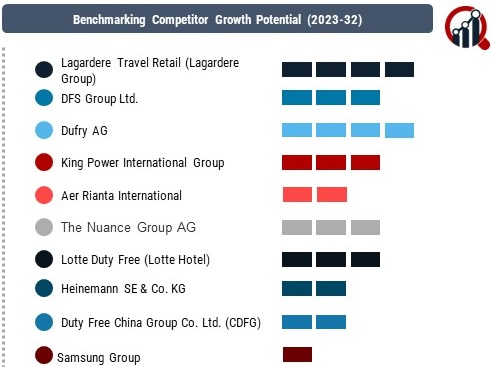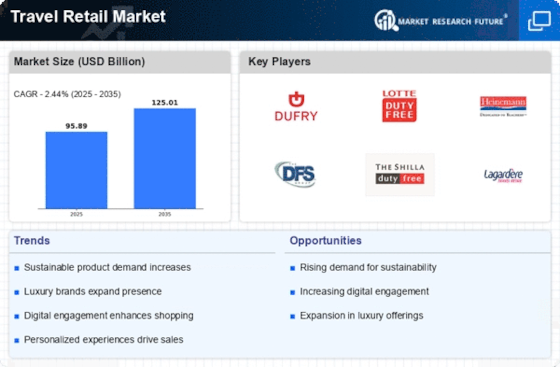Top Industry Leaders in the Travel Retail Market

Strategic partnerships and collaborations play a pivotal role in the Travel Retail Market, with companies forming alliances to enhance their offerings and geographical reach. Establishing partnerships with airlines, airports, and other stakeholders allows travel retailers to secure prime locations, diversify their product portfolios, and provide a seamless shopping experience for travelers. These collaborations also facilitate the introduction of exclusive products and promotions, creating a competitive advantage.
Innovation is a key driver in the Travel Retail Market, with companies continuously adopting strategies to enhance the shopping experience for travelers. This involves leveraging technology to provide personalized services, implementing digital solutions for duty-free shopping, and incorporating augmented reality (AR) or virtual reality (VR) experiences. Investments in advanced technologies contribute to the overall appeal of travel retail spaces, attracting consumers and fostering brand loyalty.
Brand positioning and differentiation are critical aspects of competition in the Travel Retail Market. Key players focus on establishing a strong brand identity, offering exclusive products, and creating an inviting shopping environment. The ability to provide a diverse range of high-quality products, including luxury items and well-known brands, contributes to brand recognition and customer loyalty in the competitive travel retail landscape.
Market share analysis in the Travel Retail industry often hinges on factors such as the geographical location of stores and the ability to cater to the preferences of diverse consumer groups. Companies strategically select locations with high passenger traffic, such as major international airports and travel hubs, to maximize their reach and influence. Understanding and catering to the preferences of global travelers are crucial for gaining a competitive edge in this market.
The entry of new and emerging companies adds dynamism to the Travel Retail Market. Smaller players often focus on niche segments, offering specialized products or services that cater to specific traveler demographics. The flexibility and agility of these companies allow them to quickly adapt to changing market trends and capitalize on emerging opportunities, influencing the overall competitive landscape.
Industry news in the Travel Retail Market frequently revolves around developments in consumer behavior, travel patterns, and regulatory changes impacting duty-free shopping. Companies actively engage with industry trends, aligning their strategies with evolving consumer expectations and adapting to changes in the travel landscape. News related to duty-free allowances, travel restrictions, and evolving consumer preferences shapes the strategies of key players in the travel retail space.
Current investment trends in the Travel Retail Market reflect a focus on expanding physical store footprints, enhancing digital capabilities, and adopting sustainable practices. Companies invest in opening new outlets in strategic locations, revamping existing stores, and implementing digital solutions for seamless shopping experiences. Sustainability initiatives, including eco-friendly packaging and responsible sourcing, are increasingly becoming key investment areas to align with global consumer trends.
In conclusion, the Travel Retail Market is characterized by fierce competition among key players who employ strategies such as strategic partnerships, innovation, brand positioning, and geographic optimization to gain a competitive edge. The entry of new companies adds diversity, with a focus on niche segments and adaptability to market changes. Industry news and investment trends emphasize the importance of aligning strategies with evolving consumer behaviors, leveraging technology, and investing in sustainable practices to remain competitive in this ever-evolving market.
Industry News and Investment Landscape:
- Acquisitions in the recent past, such as Dufry's purchase of Hudson News, point to market consolidation patterns.
- Growing expenditures on digital platforms, technology, and customized experiences indicate a forward-thinking strategy.
- The industry is expanding due to rising demand for travel, especially in the wake of the pandemic, with an emphasis on local travel hubs.
Key Companies in the Travel Retail Market Include –
- Lagardere Travel Retail (Lagardere Group)
- DFS Group Ltd.
- Dufry AG
- King Power International Group
- Aer Rianta International
- The Nuance Group AG
- Lotte Duty Free (Lotte Hotel)
- Heinemann SE & Co. KG
- Duty Free China Group Co. Ltd. (CDFG)
- Samsung Group











